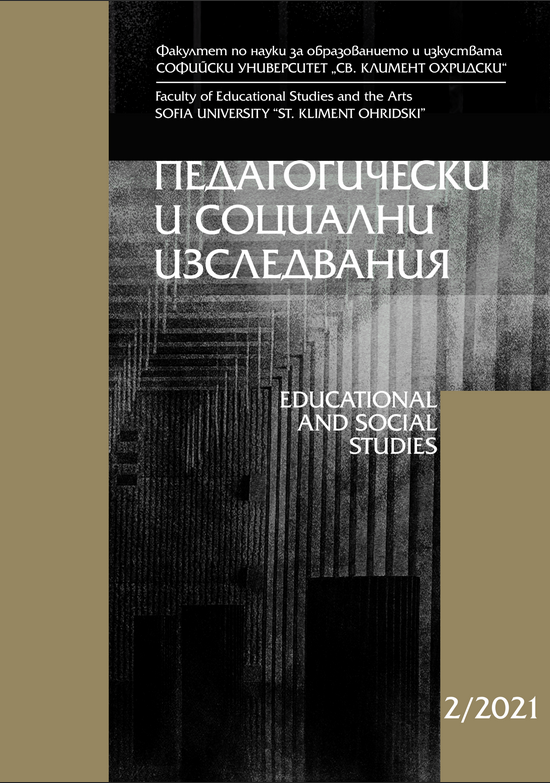The role of digital resourcesin the practical training of speech therapyand special education students
Keywords:
digital resources, practical training, online environmentAbstract
The application of digital learning resources in promotion of the development of practical knowledge and skills in students is an issue going beyond the challenges of modern educational realities. The creation of a rich set of digital learning resources will enrich and vitalize the educational process for the students of Speech Therapy and Special Pedagogy, both in the electronic and in the traditional learning settings. The purpose of this article is to give rationale for the role and place of the digital learning resources in the teaching of these specialties and highlight student preferences in relation to the application of the types and the focus of the digital resources. Method. 102 students of Bachelor, Master and Doctoral degrees in the specialties of Speech and Language Therapy and Special Pedagogy of Sofia University "St. Kliment Ohridski" took part in an electronic survey (Google form type). The questionnaire contains eight closed questions, some of the answers to which have a Likert-type response scale. The results of the survey reveal the strong preference of students towards the use of digital learning resources - video and audio files - in the course of training. A key finding is that students report that this type of resources promote collaborative comments, facilitated by the lecturer, and a more in-depth review and analysis of greater variety of cases compared to the real learning environment.
References:
Zheleva, E. (2012). Prakticheskoto obuchenie za formirane na bŭdeshtite meditsinski spetsialisti vŭv vissheto uchilishte, Nauchni trudove na Rusenskiya universitet, Tom 51, seriya 8.3., s. 143-146.
Kirilov, R. (2019). Informatsionni problemi na prakticheskoto obuchenie, sbornik Nauchni trudove na UNSS, tom 2, IK-UNSS 185-196. http://unwe-research-papers.org/uploads/ResearchPapers/RP_vol2_2019_No09_R%20Kirilov.pdf, izteglen na 25.01.2021.
Lazarova, S. (2016). Faktori za uspeshno prilagane na smeseno obuchenie v sŭvremenniya universitet https://www.mon.bg/upload/13808/05_Stoyanka_Lazarova_VTU.pdf, izteglen na 25.01.2021.
Merdzhanov, I. (2014). Elektronnoto obuchenie v akademichen kontekst – predpostavki, formi i granitsi, konferentsiya „Ikonomika i menidzhmŭnt na inovatsiite – sŭvremenni teorii i praktiki“, Varna. https://www.researchgate.net/publication/274080242_Elektronnoto, izteglen na 25.01.2021.
Peycheva-Forsayt, R., R. Bozhankova, V. Kovachev, E. Kovacheva. (2020). Strategiya za razvitieto na elektronnoto i distantsionnoto obuchenie v Sofiĭski universitet. https://www.uni-sofia.bg/index.php/bul/content/download/54417/453800/version/2/file/e-learning.pdf, izteglen na 25.01.2021.
Brower, N. & Robijns, F. (2014). In Search of Effective Guidance for Pre-service Teachers’Viewing of Classroom Video. In: Calandra B. & Rich, P.J. (Ed.) Digital Video for Teacher Education. NY and London, Routledge Tylor&Francis, https://doi.org/10.4324/9781315871714.
Comitee Permanent de Liaison des Orthophonistes-Logopedes de l’Union Europeene, CPLOL (2009). Position Statement on Practice Education during Initial Speech and Language Therapy Education Programs, https://cplol.eu/images/practice-educ_pos_stat.pdf, изтеглен на 05.01.2021.
Ilieva, J., Killingley, P., Tsiligris, V. (2019). The shape of global higher education: International Comparisons with Europe. https://www.researchgate.net/publication/333220272
Mercader, C. & Gairín, J. (2020). University teachers' perception of barriers to the use of digital technologies: the importance of the academic discipline. Int J Educ Technol High Educ 17, 4 (2020). https://doi.org/10.1186/s41239-020-0182-x.
Sherin, M.G. & Russ R.S. (2014). Teacher Noticing via Video: The Role of Interpretive Frames. In: Calandra B. & Rich, P.J. (Ed.) Digital Video for Teacher Education. NY and London, Routledge Tylor&Francis, https://doi.org/10.4324/9781315871714.





